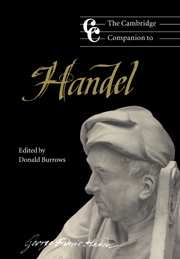Book contents
- Frontmatter
- Introduction
- Part I Background
- Part II The music
- 8 Handel and the aria
- 9 Handel's compositional process
- 10 Handel and the idea of an oratorio
- 11 Handel's sacred music
- 12 Handel's chamber music
- 13 Handel as a concerto composer
- 14 Handel and the keyboard
- Part III The music in performance
- Bibliographical note
- Notes
- List of Handel's works
- Index
13 - Handel as a concerto composer
from Part II - The music
Published online by Cambridge University Press: 28 September 2011
- Frontmatter
- Introduction
- Part I Background
- Part II The music
- 8 Handel and the aria
- 9 Handel's compositional process
- 10 Handel and the idea of an oratorio
- 11 Handel's sacred music
- 12 Handel's chamber music
- 13 Handel as a concerto composer
- 14 Handel and the keyboard
- Part III The music in performance
- Bibliographical note
- Notes
- List of Handel's works
- Index
Summary
London, where Handel spent his mature career, can be regarded as the historical home of the public concert. John Banister's concerts in 1672 have a claim to being the first-ever series of such concerts, though Banister may previously have attempted a similar venture in Oxford. During Handel's lifetime benefit concerts, usually involving a mixed programme of instrumental and vocal items, were a regular, if occasional, part of the London theatre programmes. Hickford's concert room was an established concert venue, and was one of the places attended by a visiting Frenchman in the mid 1720s:
While we are on the subject of music, I must tell you about the public concerts in London, which are poor stuff compared with ours. We heard one which took place in a low room, decorated throughout but with dirty paint, which is usually a dance-hall; there is a platform at one end that you climb a few steps to get on to, and that is where the musicians are placed. They played some sonatas and sang English and German ballads: you pay 5 shillings for these inferior concerts. We attended another concert on the first floor of a coffee-house, where the violins from the opera house play every Thursday. They were all Germans, who play very well but rather inexpressively; one of them played the German flute excellently. We also saw a clergyman playing the cello.
- Type
- Chapter
- Information
- The Cambridge Companion to Handel , pp. 193 - 207Publisher: Cambridge University PressPrint publication year: 1997
- 1
- Cited by



